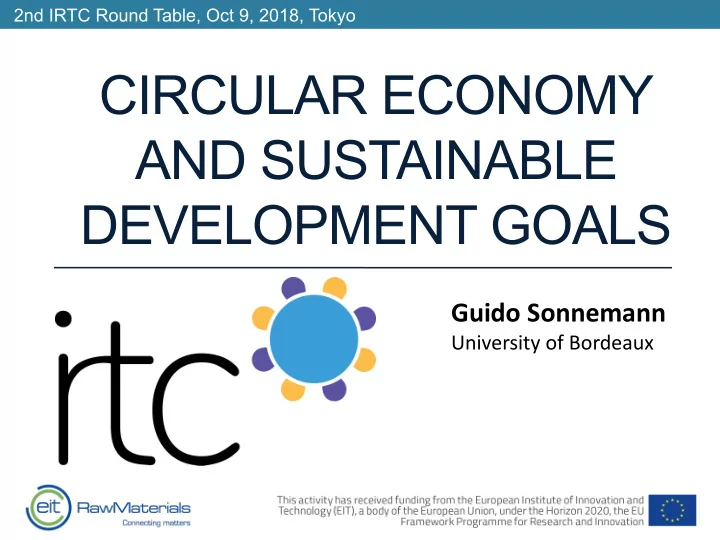

2nd IRTC Round Table, Oct 9, 2018, Tokyo CIRCULAR ECONOMY AND SUSTAINABLE DEVELOPMENT GOALS Guido Sonnemann University of Bordeaux
2nd IRTC Round Table, Oct 9, 2018, Tokyo Outline • Introduction: From the Millennium Development Goals to the Sustainable Development Goals • Clustering the Sustainable Development Goals (SDGs) • The role of Circular Economy, resource efficiency and related assessment tools • Conclusions and perspectives for critical raw materials
2nd IRTC Round Table, Oct 9, 2018, Tokyo Millennium Development Goals Sustainable Development Goals
Environmental Sustainability: Ecological Footprint approach If we go on with current production and consumption patterns, Two planets are needed by 2050 1900 2002 2050 2100 Source: Wackernagel M
2nd IRTC Round Table, Oct 9, 2018, Tokyo Twin Challenge for Sustainable Development
2nd IRTC Round Table, Oct 9, 2018, Tokyo
2nd IRTC Round Table, Oct 9, 2018, Tokyo Clustering of SDGs
2nd IRTC Round Table, Oct 9, 2018, Tokyo Circular Economy System Diagram
2nd IRTC Round Table, Oct 9, 2018, Tokyo The role of the Circular Economy (CE)
2nd IRTC Round Table, Oct 9, 2018, Tokyo
2nd IRTC Round Table, Oct 9, 2018, Tokyo Two aspects of decoupling Source: International Resource Panel
2nd IRTC Round Table, Oct 9, 2018, Tokyo And what is with Resource Efficiency? Efficiency at economic level + Environmental dimension + Resource efficiency (RE) (raw materials, energy, water, land) Reducing the environmental impact of consumption and production of goods and services over their full life cycles § à By producing more wellbeing with less material consumption, RE enhances the means to meet human needs while respecting the ecological carrying capacity of the Earth. Source: Strothmann P, Sonnemann G (2017) Circular economy, resource efficiency, life cycle innovation: same objectives, same impacts? Int J Life Cycle Assess 22 (8), 1327-1328
2nd IRTC Round Table, Oct 9, 2018, Tokyo Supporting role of input-output based industrial ecology assessment tools « If you cannot measure it, INPUT OUTPUT you cannot improve it » Atmospheric (Lord Kelvin) Acquisition of Emissions 1 raw material 8 Raw Waste 2 material Waters • Life cycle Assessment 4 Production - Solid 1 Wastes • Material Flow Analysis 9 Use/ reuse/ maintenance Co-products 0 7 Energy • Environmentally Extended Other Recycling Wastes Input Output Analysis Waste Management Boundaries of the system System Boundaries
2nd IRTC Round Table, Oct 9, 2018, Tokyo Key indicator areas for environmental sustainability assessment Drivers Pressures Energy Materials Biodiversity State Climate Health Supply security Impacts Land Water Responses
2nd IRTC Round Table, Oct 9, 2018, Tokyo UNE Life Cycle Initiative’s recommendations on impact indicators for abiotic resources Source: UN Environment upcoming
2nd IRTC Round Table, Oct 9, 2018, Tokyo Which Raw Materials are critical in line with the SDGs and what is the link to CE? Economic growth Raw Materials for Low carbon and RE technologies with Supply Risk
2nd IRTC Round Table, Oct 9, 2018, Tokyo Perspectives • Develop a framework on the role of critical raw materials for sustainable development • Consider the context of a circular economy • Specify the scope of criticality assessment • Discuss the potential complementary role of other industrial ecology assessment tools • Embed the framework into the Sustainable Development Goals • Rethink if current 3-dimensional SDGs clusters are best suited for considering the role of critical raw materials
2nd IRTC Round Table, Oct 9, 2018, Tokyo Thank you for your attention! Prof. Dr. Guido Sonnemann guido.sonnemann@u-bordeaux.fr CyVi Groupe de recherche sur l’Analyse du Cycle de Vie et Chimie Durable Institut des Sciences Moléculaires - ISM Université de Bordeaux – UMR 5255 CNRS 351 Cours de la libération – Bât A12 33 405 TALENCE cedex – France Tél : 05 40 00 30 90 Web : http://www.ism.u-bordeaux.fr & http://cyvigroup.org
Recommend
More recommend